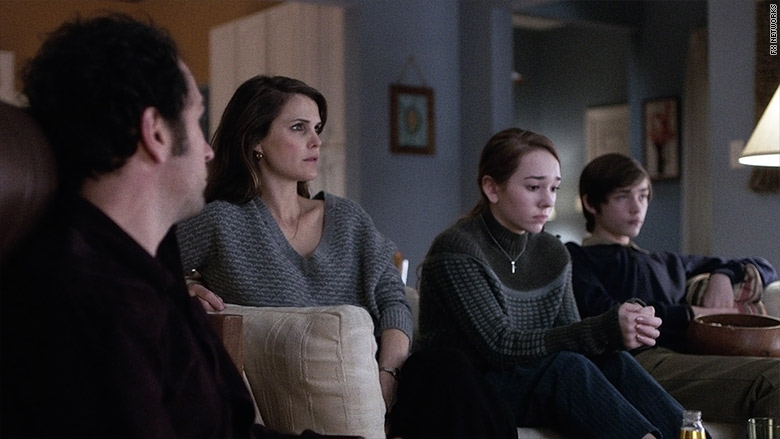
"The Americans," FX's critically acclaimed Cold War-era drama, devotes much of its May 11 episode to a TV movie.
Not just any movie -- "The Day After."
The nuclear apocalypse tale, which ABC aired in 1983, remains the highest-rated broadcast ever in that genre.
The episode seeks to capture the film's extraordinary impact. The show's central couple, a pair of Russian spies (played by Matthew Rhys and Keri Russell), uncomfortably watches with their teenage daughter (Holly Taylor), who is aware her parents are Soviet moles.
At the time, an estimated 100 million people saw the film, with 46% of all homes in the U.S. tuning in, per Nielsen data. That rating is roughly equivalent to what the Super Bowl regularly attracts.
Indeed, it's hard to imagine now, amid an age of fragmented, time-shifted, binge TV viewing, the communal experience that something like "The Day After" represented -- or how it became dinner table conversation. That was one of the points the series' producers, in fact, wanted to drive home.
Related: TV political dramas, even those that are 'bonkers,' collide with reality
"It was very much in the consciousness, and it had a huge effect on the hero of our show, Ronald Reagan," said "Americans" creator Joe Weisberg, referring to diary entries that indicated the then-president was powerfully affected by the movie.
Reagan wasn't alone. Children below a certain age were urged not to watch the movie, which depicted the devastating effects of a nuclear strike hitting Lawrence, Kansas.

"The Day After" was broadcast without commercials throughout its final section.
The 2 ¼-hour telecast ultimately contained just 12 minutes of ads. Anti-nuclear activists, meanwhile, hosted viewing parties.
The late Brandon Stoddard, ABC's then-entertainment president, explained in an interview for the Archives of American Television that sponsors were "terrified to be in the movie," which was "not exactly a perfect advertising climate for Pepsi Cola."
Related: 'Game of Thrones,' 'The Walking Dead' Play fast and loose with the truth
The network came under enormous pressure not to air "The Day After" at all. That included entreaties from the Reagan White House, which asked for edits two days before its Sunday night telecast.
ABC rejected that request. But the network felt compelled to offer a televised response from Secretary of State George Shultz immediately after the movie. Stoddard recalled receiving death threats.
Beyond the Cold War, the moment speaks to a different era of media. "It's hard to quite explain what television meant to everyone," Joel Fields, Weisberg's fellow executive producer, noted.
The late 1970s and early '80s, in fact, reflect TV at perhaps the apex of its influence, exemplified by events such as "Roots," the "MASH" finale and, yes, "The Day After."
Producers of "The Americans," which is in its fourth and perhaps best season, have consistently sought to use such references to the period's culture as a touchstone. That includes another recent, lighter nod to the David Copperfield special where the magician made the Statue of Liberty disappear.
But they recognize the mild irony in doing that within a cable show watched by a few million dedicated fans every week, compared to the sort of mass appeal that TV could deliver in the early 1980s, when most people received a mere handful of channels.
"'The Day After' today would be a 10-part series streaming on Amazon," Weisberg quipped.
To which Fields added, "Reagan wouldn't have seen it."


